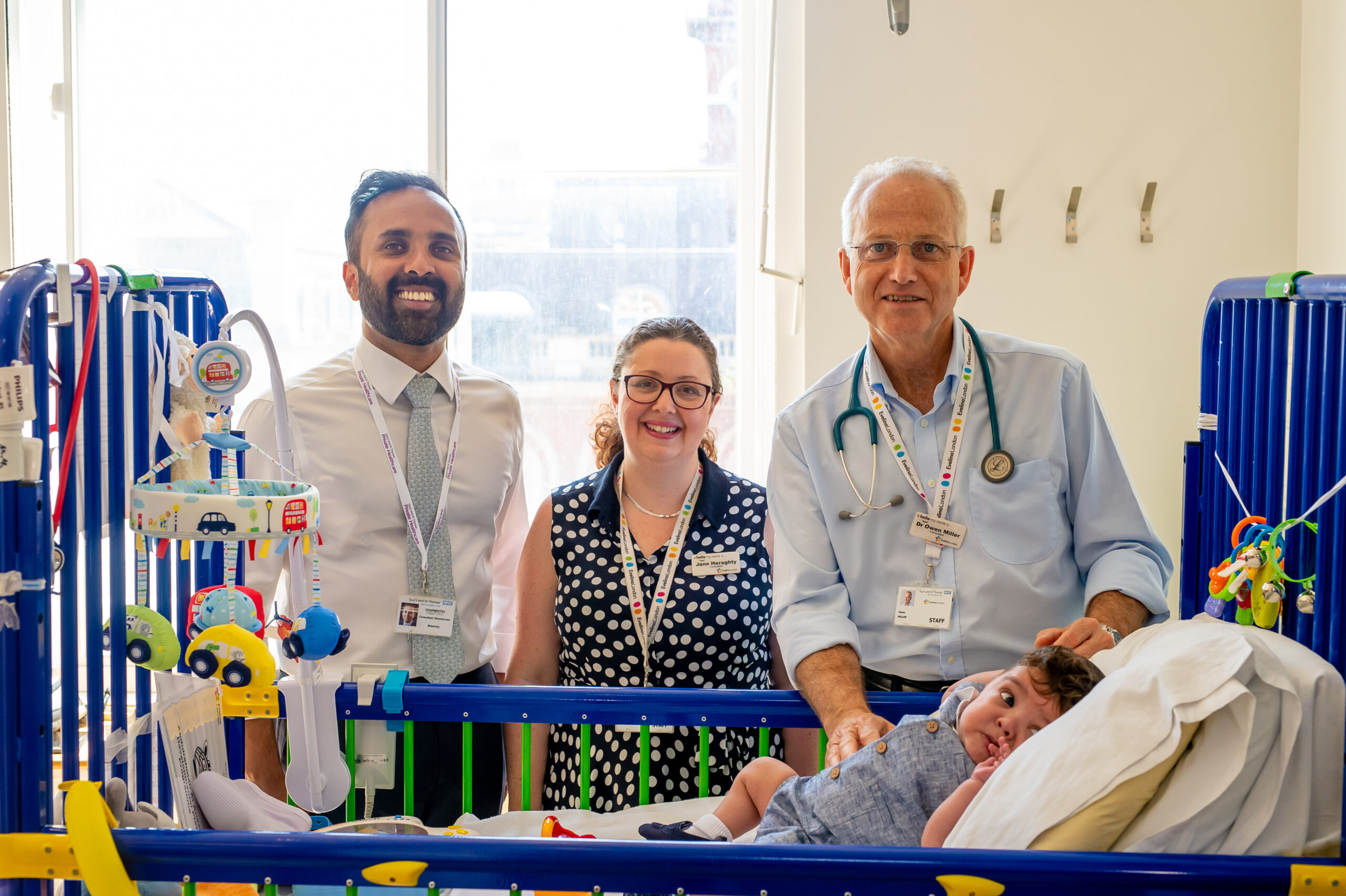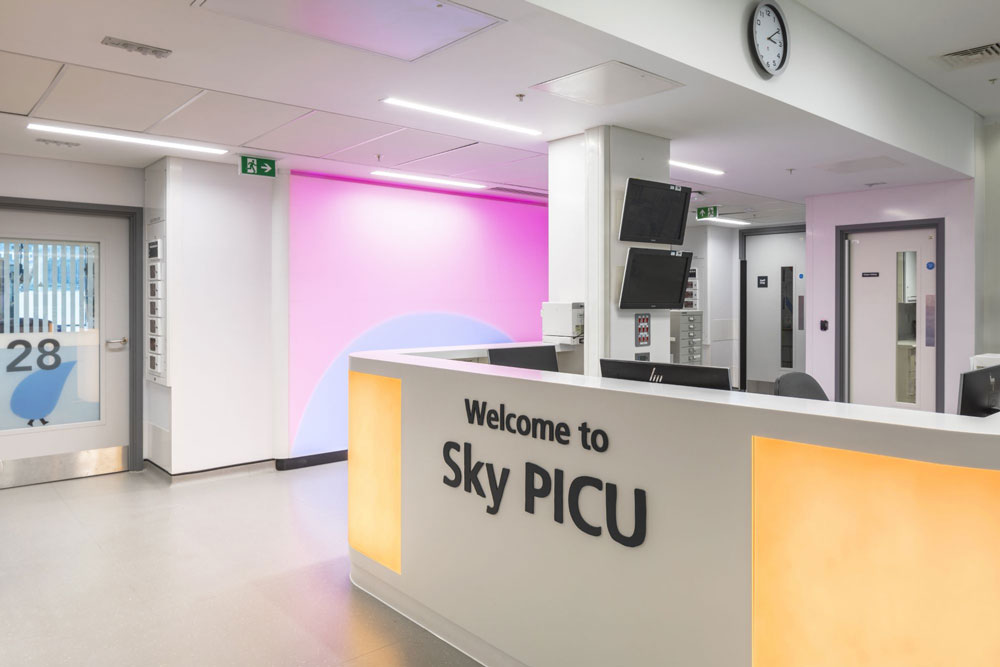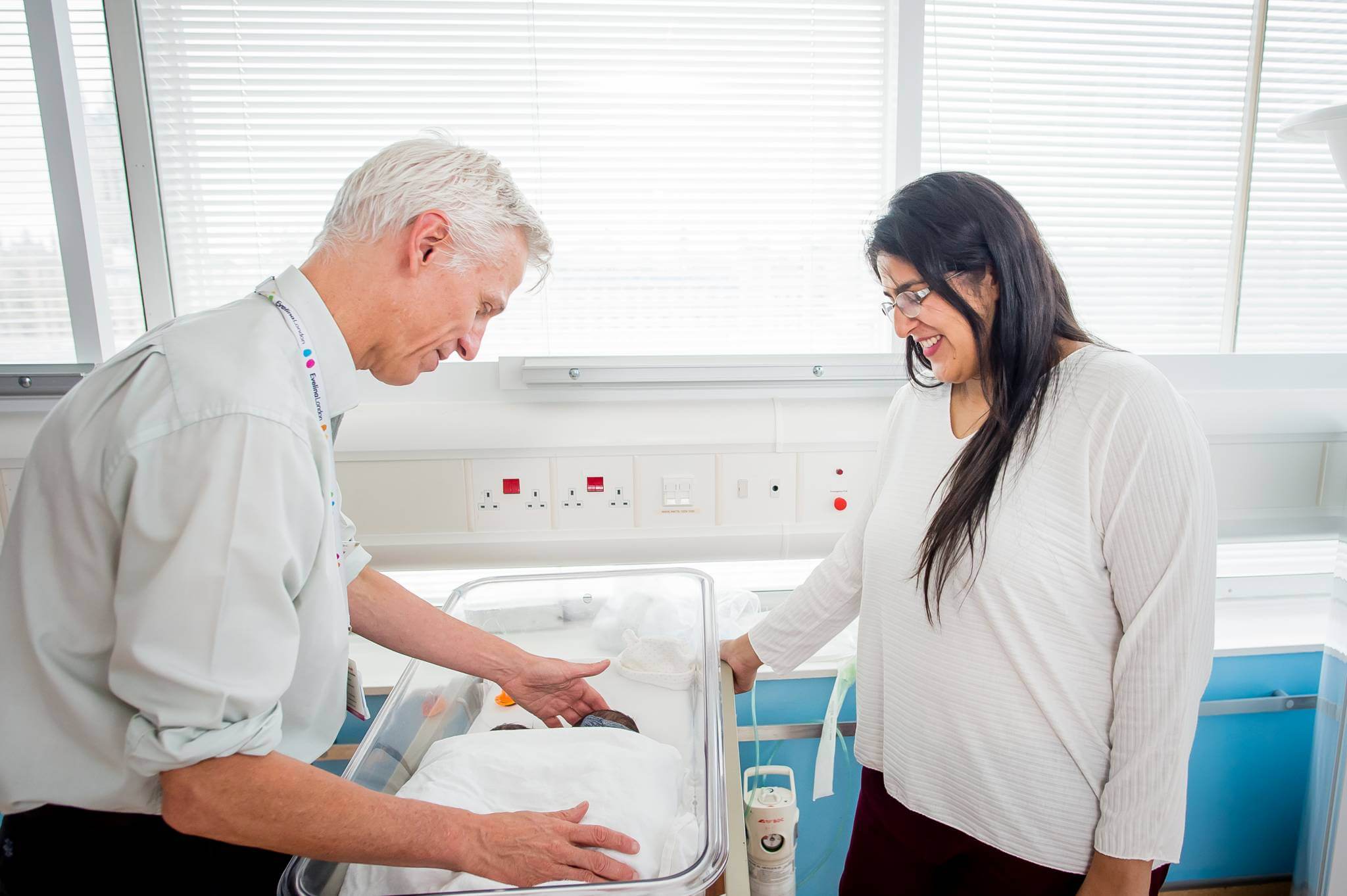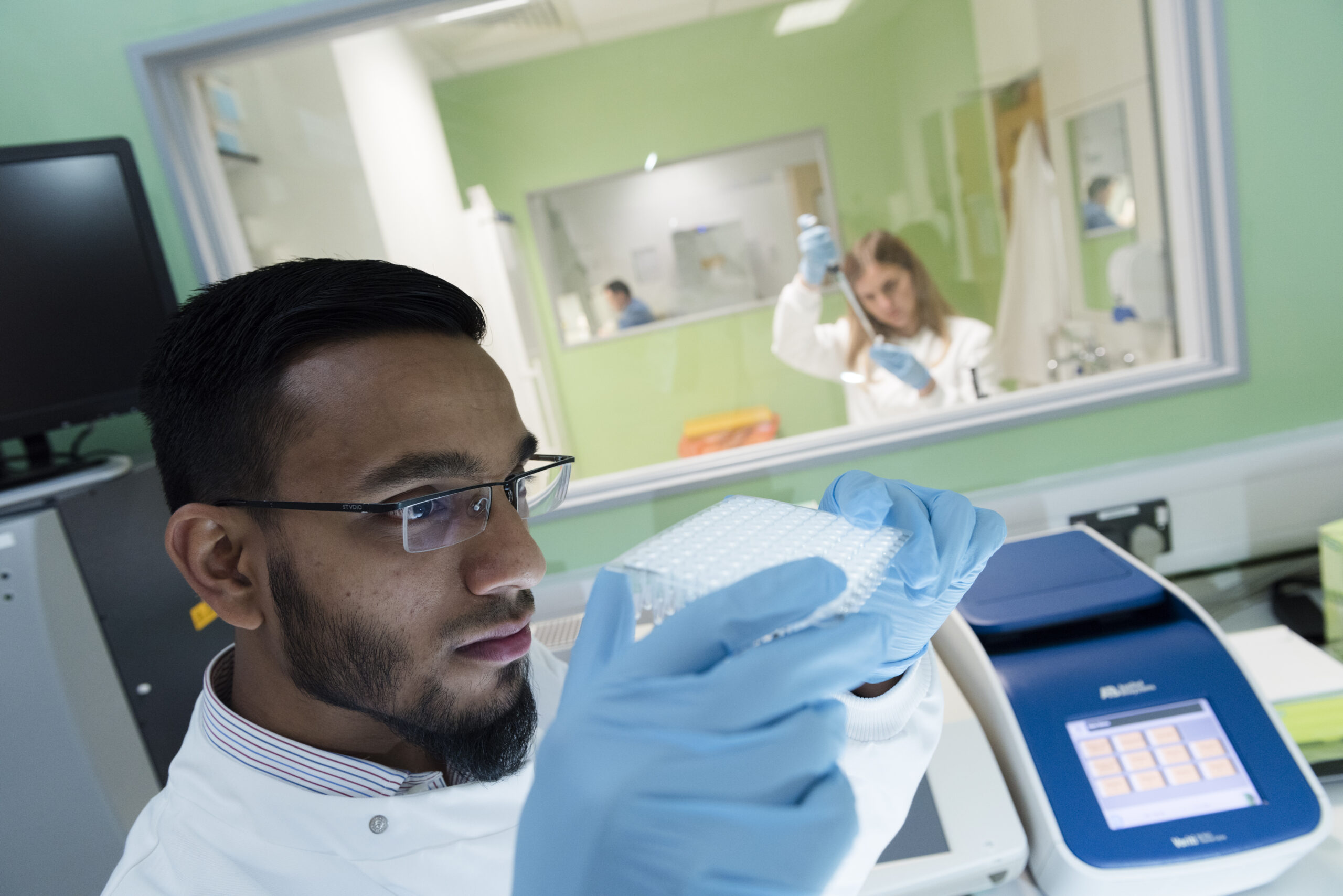Our specialists at Evelina London Children’s Hospital and Royal Brompton Hospital work together to deliver our paediatric cardiology service. Both hospitals are recognised as world-leading centres – Evelina London for children’s care and Royal Brompton for cardiology.
Expert children’s heart care
We offer life-changing treatment for patients from before birth (fetal cardiology), and throughout early childhood, adolescence and into adulthood, caring for over 6,000 patients each year.
Our paediatric cardiologists diagnose and treat a range of children’s heart conditions, including congenital heart disease (which is present from birth), acquired heart disease (which develops after birth), and heart rhythm disturbances.
We have the expertise to treat all children’s heart problems, including the most complex cases, with patients referred to us from across the globe.

Specialist heart care for all ages
As we provide specialist adult heart care at Royal Brompton, we can support patients in their transition to adult care and throughout life. Our adult congenital heart disease unit was the first of its kind in Europe and is currently the largest.
With our multidisciplinary team of specialists across diagnostics and surgery, we ensure the highest standards of heart care.

Learn about our facilities at Sky Ward at Evelina London where we treat children with heart conditions.
Our history of innovation
We have achieved many UK and world-firsts in children’s cardiology, including the:
- UK’s first fetal cardiology service, which is now one of the largest and most experienced in the world
- UK’s first heart operation on a child with congenital heart disease
- world’s first children’s hospital to introduce routine 3D MRI scans to diagnose congenital heart disease in babies while still in the womb
- world’s first fetal cardiac intervention
- world’s first children’s MRI-guided catheter intervention
We continue to research innovative applications including artificial intelligence and virtual reality imaging to improve patient care.
Learn about our expertise in children's heart procedures.
Inpatient wards
Our children’s cardiology inpatient services are provided on Sky Ward at Evelina London and Rose Ward at Royal Brompton.
We use the latest imaging techniques to diagnose and monitor our patients, as well as innovative technologies to perform our advanced heart treatments and surgical procedures.
Both wards have critical care and high dependency facilities, which are crucial in managing the health of children in the first hours and days after their heart surgery.

Paediatric intensive care units (PICU)
We can provide complex care for critically ill babies and children at our paediatric intensive care units (PICU) available at both hospitals. These units are for children that require intensive care following emergency or planned heart surgery.
Our multidisciplinary support includes extracorporeal membrane oxygenation (ECMO) treatment for the sickest children with severe cardiorespiratory failure.
We also have high-dependency bays for children recovering from surgery and who may need extra physical support or close monitoring.

Neonatal unit
Each year, we care for over 1,000 babies in our neonatal unit at Evelina London, which is one of the largest in England. It includes a neonatal intensive care unit (NICU), special care baby unit (SCBU) and high dependency unit (HDU). This enables us to provide 24-hour care for premature and sick babies with high dependency needs, including cardiac, respiratory, and neurological conditions.
Our unit is also a major centre for neonatal research, in partnership with King’s College London, helping us lead the way in innovative treatments for babies.

Clinical genetics and genomics laboratory
We offer advanced genetic testing for families and individuals at risk of inherited heart and lung conditions at Royal Brompton.
Our service includes next-generation sequencing (NGS), including copy number variant analysis, for the full spectrum of heart and lung conditions. This helps improve diagnosis for patients and their families.
We have a multidisciplinary team of specialists that work closely together to support our patients, including clinical geneticists, genetic counsellors, and specialist physicians. This ensures that patients receive the professional advice they need before and after testing.

Conditions
-
Aortic aneurysm
Aortic aneurysm occurs when a part of the aorta becomes weak and becomes enlarged.
-
Aortic regurgitation
Aortic regurgitation is when the valve blood leaks back into the heart through the valve.
-
Aortic stenosis
Aortic stenosis is a disease that affects the main outlet valve of the heart and is the third most common cardiovascular disease.
-
Arrhythmia (abnormal heart rhythm)
Arrhythmia is an abnormal heart rhythm, where the heart’s normal rhythm is disrupted.
-
Atrial fibrillation
Atrial fibrillation is a heart rhythm disorder where your heart beats irregularly, either too fast or too slow. Learn about how our cardiology specialists can treat it.
-
Congenital heart disease
Congenital heart disease is a collective term for a range of birth defects that affect the heart. Learn more about how it is diagnosed and treated.
-
Heart failure
Heart failure occurs when the heart stops being able to pump blood around the body in an efficient way.
-
Hypertrophic cardiomyopathy
Hypertrophic cardiomyopathy is the most common form of genetic heart disease, where unusual thickness of the heart muscle makes it harder for the heart to pump blood.
-
Inherited cardiac conditions
Inherited cardiac conditions are a group of genetic disorders that affect the heart and major vessels.
-
Left ventricular outflow tract obstruction (LVOTO)
Left ventricular outflow tract obstruction (LVOTO) is a recognised feature of hypertrophic cardiomyopathy.
-
Mitral regurgitation
Mitral regurgitation is the most common heart valve problem worldwide. It is a dysfunction of the heart’s mitral valve.
-
Tricuspid regurgitation
Tricuspid regurgitation is when the tricuspid valve of the heart doesn't close properly.
-
Valvular heart disease
Heart valve disease occurs when the valves of the heart become diseased or damaged.
Treatments
-
Aortic valve repair and replacement
An aortic valve repair or replacement procedure treats a damaged aortic valve in your heart to enhance blood flow.
-
Cardiac ablation
Cardiac ablation is an advanced procedure used to treat irregular and fast heart rhythms.
-
Coronary angioplasty
Coronary angioplasty is a procedure that improves blood flow to your heart.
-
Heart valve repair or replacement
Heart valve surgery can repair or replace a damaged valve.
-
Mitral valve repair and replacement
Mitral valve repair and replacement surgeries are used to fix problems with your mitral valve. Discover more about these surgeries.
-
Pacemakers and implantable cardioverter defibrillators (ICDs)
Pacemakers and ICDs are different types of implanted electronic devices that are capable of regulating heart rhythm disturbances.
-
Personalised external aortic root support (PEARS)
Personalised external aortic root support treats and manages aortic dilation and dissection in patients with Marfan syndrome.
-
Tricuspid valve repair and replacement
Damaged tricuspid valves are treated using either a tricuspid valve repair or replacement procedure. Discover more about these innovative treatments.
Investigations
-
Cardiac imaging in children
Children's cardiac imaging helps diagnose heart diseases and defects. Diagnostics include echocardiography, cardiac MRI, CT and ECG.
-
Cardiac MRI scan (CMR)
A cardiac magnetic resonance (CMR) scan is non-invasive and shows detailed images of your heart.
-
CT coronary angiography scan
A CT (computerised tomography) coronary angiography is a type of scan that shows the structure of the heart and the arteries which supply blood to the heart.
-
Diagnostic tests for heart conditions
We offer a range of diagnostic tests at our state-of-the-art facilities.
-
Echocardiogram
An echocardiogram – also known as an echo – is a scan that examines the heart and surrounding blood vessels.
-
Electrocardiogram (ECG)
An electrocardiogram (also known as an ECG) is a test which is used to check your heart’s rhythm and electrical activity.
-
Electrophysiology testing for arrhythmias
By recording and studying the electrical activity of the heart, we are able to determine the underlying cause of a heart rhythm problem.
-
Exercise stress test
An exercise stress test assesses how the heart is working during physical activity.
-
PET-CT and nuclear medicine
PET-CT and nuclear medicine scans use small amounts of radioactive material to diagnose a variety of diseases.
Locations
Our children's cardiology specialists provide care at the following locations:
Discover our children's cardiology experts
Our children’s heart specialists work in multidisciplinary teams to provide access to the full breadth of clinical services ensuring high quality expertise and specialist care.